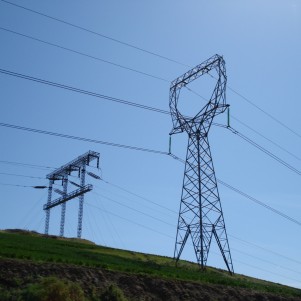Power industry ads knock cost, job impacts of Canadian hydropower
By State House News Service | April 12, 2016, 8:37 EDT
 Screenshot of hydrotruthma.com.
Screenshot of hydrotruthma.com. STATE HOUSE — With the ink barely dry from Gov. Charlie Baker’s signature on an expansion of solar development incentives, the Bay State’s power generators on Tuesday plan to intensify their opposition to the governor’s efforts to import large-scale hydroelectric power to Massachusetts as the debate over energy moves to the next phase.
The New England Power Generators Association, whose member companies operate the lion’s share of the generation capacity in Massachusetts, are launching a digital ad campaign targeting the expense, reliability and economic impact of importing hydropower from Canada.
The web ads, according to the association, are designed to reach target audiences, including lawmakers and leaders in the business and environmental communities, who could help shape the debate in the Legislature over the next few months over the state’s energy future.
“We want to get the headlines out there, get our one-line message, but then have a longer conversation,” said Dan Dolan, president of the New England Power Generators Association. “We’re, from an overall standpoint, looking at this as the beginning of the conversation.”
One ad, reviewed by the News Service, reads: “What happens when Massachusetts sends $20 billion to the Quebec government? Local jobs follow.” Another asks and answers, “Should MA families pay $777 million more a year for electricity? Hydro-Quebec thinks so.”
The ads all refer back to a new website www.hydrotruthma.com that lays out the generators’ central arguments.
The NEPGA believes that the state’s energy needs would be best met by letting the market respond to the forthcoming retirements of an estimated 10,000 megawatts of power from Pilgrim Nuclear Power Station and other retiring power plants.
A study produced for the group by former Weld administration energy secretary Sue Tierney estimated the cost of importing hydropower from Quebec of the magnitude proposed by Baker would add $777 million a year in costs for ratepayers, including the cost of building transmission lines from Canada through New England.
The group’s position, however, is at deep odds with both Baker and legislative leaders who have already signaled the direction the energy debate is likely to follow later this spring.
The governor filed legislation last year that would authorize utilities to solicit competitive contracts for 1,200 to 2,400 megawatts of hydroelectic power. Under his proposal, Baker has said the state could reject the offers if the prices weren’t competitive with other sources of baseload power.
More recently, House Speaker Robert DeLeo told the Greater Boston Chamber of Commerce that the House bill expected to emerge next month will create a competitive procurement process for hydroelectricity and off-shore wind energy. He did not put a specific number of the amount of power from each source utilities might be required to solicit.
“I’m confident that we’ll get it done and quite frankly we have to get it done. I’m not sure we have any choice,” DeLeo told reporters Monday when asked whether the five months it took to negotiate a solar bill with the Senate bode poorly for the omnibus energy bill’s prospects.
DeLeo said he hoped to debate a bill in the House “sometime in May or so.”
While the administration and the Legislature are operating under the pretense of an urgent need for action to replace retiring fossil fuel plants with clean and reliable sources of energy, Dolan questioned whether government involvement at this stage is necessary.
Asked if he thought a bill needed to get done this session, Dolan said, “The short answer is no. We see a market that in March had the lowest wholesale electricity prices in a single month in the history of the New England marketplace.”
Dolan said the market has already responded to the impending loss of generation at Pilgrim and Brayton Point, a coal-fired plant, without the incentive of long-term contracts proposed in Baker’s hydro bill. He said there is 3,200 megawatts of new natural gas capacity in development in Salem, Sandwich and Medway and other new or expanded plants planned in Rhode Island and Connecticut with 1,000 megawatts of additional generation capacity.
“To the degree that there are additional goals or constraints that the state is looking at from an emissions standpoint, the proper role for policy is to set the standards and let the market meet them,” Dolan said.
By signing long-term contracts to import Canadian hydropower, Dolan said domestic plants, which provide more than 2,000 jobs and $100 million in tax revenue, would be at risk of closure.
After a recent meeting with the three immediate past energy secretaries, all of whom support Baker’s bill, the governor said relying on the solutions put forward by NEPGA would expose the region to price volatility with no environmental benefits and lead to “natural gas across New England for pretty much everything forever.”
“If you want to play the game on the world market with no predictability around price and no reliability and a purely fossil-based solution, Ok. But that’s certainly not the one that we believe is the right one for either Massachusetts or New England and neither do the rest of the governors,” Baker said.
Dolan, however, said energy prices can be inherently volatile regardless of the sources, and said that four of the past six electricity shortages in New England were caused by disruptions in Canadian hydropower exports due to events such as a forest fire.
“Because it’s a provincial-owned company for the province of Quebec, it’s difficult to imagine a scenario in which something like that happens and the utility does not prioritize its owners or users in the province of Quebec,” Dolan said.
Furthermore, Dolan said power generators have reduced carbon emissions in Massachusetts by 51 percent since 1990, helping the state toward is emission reduction goals, and utilities will continue to be bound by the Global Warming Solutions Act to purchase renewables, thereby growing the solar, wind and domestic hydro industries.
Meanwhile, transportation industry emissions, according to NEPGA, continue to increase and now emit more than twice as much carbon as power plants.
Environmental groups, such as the Environmental League of Massachusetts, want to see Baker and lawmakers embrace an all-of-the-above strategy on energy to promote not just hydropower, but also solar and off-shore and land-based wind.
— Written by Matt Murphy
Copyright State House News Service











